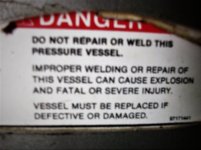aczlan
Good Morning
- Joined
- Mar 7, 2008
- Messages
- 17,540
- Tractor
- Kubota L3830GST, B7500HST, BX2660. Formerly: Case 480F LL, David Brown 880UE
Better avoid Ingersoll Rand compressors in the future as they use that terminology: Air Compressor Receiver Tanks | Ingersoll RandInteresting video on water testing an air tank. Two things I learned was water dont compress like air and he tested an air tank not a receiver tank, must be a British term, either way I outlawed that terminology in my house and am throwing away all books that uses it....
Aaron Z

